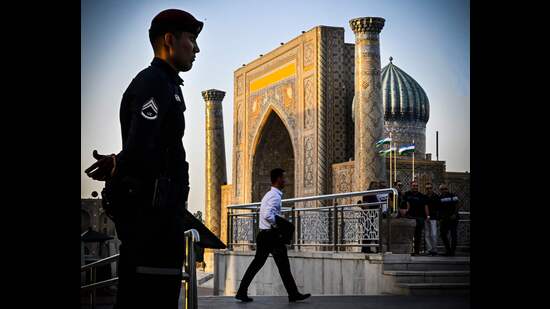Beyond China, why SCO is key
Prime Mnister Narendra Modi’s presence in the Samarkand meet shows India is engaging with the world on its own terms
There is a China-shaped cloud looming on the horizon in Samarkand, Uzbekistan, where the 22nd meeting of the Shanghai Cooperation Organisation (SCO) will begin today. It will not be unfair to say that the prospect of a meeting between Prime Minister (PM) Narendra Modi and Chinese President Xi Jinping remains the most speculated-about event. Whether the interaction takes the form of a formal meeting — if it does, it will be the first between the two leaders since border tensions flared up in 2020 — an unscheduled conversation, a photo opportunity, exchange of pleasantries or nothing at all will be analysed threadbare to parse New Delhi’s strategy on containing its belligerent neighbour.

Despite this feverish speculation, a set of other possible engagements that may end up on the Indian PM’s roster hold equal, if not more, importance. Key among them is a possible meeting with Russian President Vladimir Putin, coming against the back-drop of Moscow’s surprise reverses on the battlefield in eastern Ukraine and increasing global pressure to isolate Russia. Despite calls from the West, India has not only protected the status quo in its ties with Russia, but has stepped up energy imports. Whether Mr Modi chooses to signal greater warmth in ties will be key — especially to policymakers sitting in western capitals. The other crucial engagement, if it happens, will be with Iranian President Ebrahim Raisi, at a time both countries are close to striking an agreement for operations at the Chabahar port. If they meet, Mr Raisi is expected to bring up the question of the resumption of Iranian crude imports that were stopped under the threat of sanctions three years ago. How India handles this sensitive issue with a long-term ally that is also a leader in the Islamic world will have long-term implications.
Beyond the bilaterals, though, and irrespective of whether they happen, Mr Modi’s presence at SCO sends out an important message of an India unafraid of dynamically engaging with the world on its own terms, and in accordance with its interests. That this comes just four months after Mr Modi stood shoulder-to-shoulder with another group of world leaders at the Quad summit in Tokyo — leaders who are on opposite ends of the global ideological and geopolitical spectrum to many at Samarkand — shows that New Delhi has carved out a unique space in its plurilateral engagements. Whatever the outcome in Uzbekistan may be, this new brand of actively engaged, interest-based diplomacy is here to stay, and will see its pinnacle next year, when India will host not only the G20 summit, but also the SCO.
All Access.
One Subscription.
Get 360° coverage—from daily headlines
to 100 year archives.



HT App & Website






